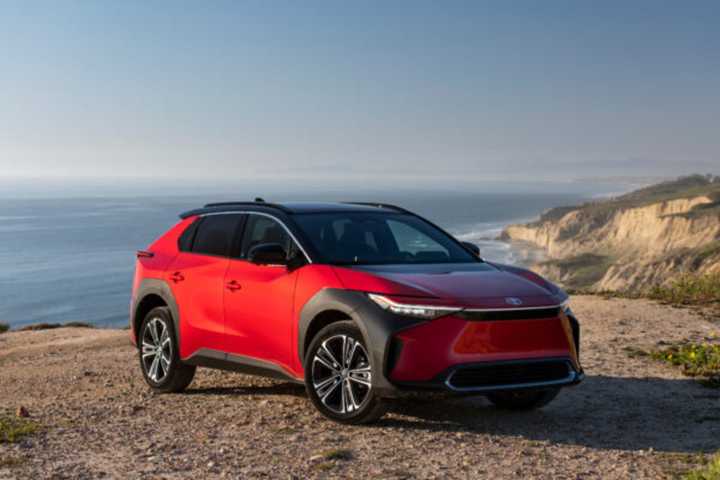The Toyota bZ4X is the Japanese brand’s only EV offering in the U.S., and that’s likely to be the case for quite some time. This is because the company insists on a conservative approach to electrification until the world’s EV network and infrastructure are up to standard. The EV crossover isn’t the best example in its segment, which is why it hasn’t been performing quite as well as its rivals in the sales charts. Toyota hasn’t given up on its EV project, with the official bZ replacement set to arrive in the coming months, introducing a host of key improvements that will give it more of an edge. That’s only if the brand can get pricing right amidst the discontinuation of the Clean Air Act tax rebate.


- Base Trim Engine
-
EV
- Base Trim Transmission
-
Automatic
- Base Trim Drivetrain
-
Front-Wheel Drive
- Base Trim Horsepower
-
201 HP
- Base Trim Torque
-
196 lb.-ft.
- Base Trim Fuel Economy Equivalent (city/highway/combined)
-
121/102/112 mpge
- Base Trim Battery Type
-
Lead acid battery
- Make
-
Toyota
- Model
-
bZ4X
Regardless, if you’re planning to purchase a bZ4X with long-term ownership in mind, you’re inevitably going to have the battery pack modules exchanged once they reach the end of their lifespan. Lithium-ion battery cells degrade with time and use, resulting in a chemical instability that prevents them from maintaining the same level of charge compared to when they were created. Toyota is working hard at making battery replacement technology a less costly and frequent problem, but it remains an expensive repair to conduct, especially if the pack has been subject to damage beyond repair.
To give you the most up-to-date and accurate information possible, the data used to compile this article was sourced from Toyota and other authoritative sources, including the EPA.
How Much A New Toyota EV Battery Costs
Prepare To Spend Tens Of Thousands On A New Pack
Toyota U.S. offers a really great online parts catalog, but unfortunately, it fails to disclose the cost of a new battery pack. Interestingly, it does reveal the prices of all the auxiliary components, including the onboard charger, inverter, and voltage sensors, with prices ranging between $7,338.40 and $14,380.78.
You’ll only ever need to consider these components in the event that any of these parts are subject to damage caused by a collision or a manufacturing fault. A third-party retailer lists two bZ4X battery packs from the 2023 model year, which are identical to the example on offer today. This indicates that you can expect to pay $19,831.50 for the full pack, before labor costs, which will increase the final repair price by a few thousand dollars.
Once your EV’s battery reaches the end of its lifespan, you won’t have to have the full battery pack replaced, but rather the affected modules. The bZ4X’s 71.4-kWh battery pack consists of eight modules. Estimates suggest that a full module replacement will cost between $8,000 and $10,000, excluding labor. Toyota’s official EV battery supplier is Panasonic. The two firms work together via a joint venture called Prime Planet Energy and Solutions.
Toyota also sources batteries from other companies like CATL and BYD to meet increasing demand. The company plans to introduce next-generation battery technologies, including solid-state batteries, as soon as 2028, with the promise of faster charging times, improved safety, and longer ranges. Toyota has also announced plans to reduce battery costs by 50 percent through innovations in materials and production. The automaker aims to achieve carbon neutrality by 2050, with these advancements playing a key role in scaling up its EV offerings.
How Long The bZ4X’s Battery Lasts
You’ll Only Need To Replace This Part After A Decade
Toyota has gone on record to say that the bZ4X’s battery will retain 90 percent of its capacity after 10 years of regular usage with the best maintenance and care practices. To extend the lifespan of your Toyota bZ4X’s battery, there are a few habits that you should be forming.
Maintaining a strict and balanced charging procedure is the best way to extend long-term battery life. This includes keeping the battery’s charge between 20 and 80 percent if you’re using it every day. Regularly draining the battery from 100 percent will accelerate how quickly your battery pack loses chemical stability to the point where you’ll need to have the modules replaced.
It’s also a good idea to use DC Level Three fast chargers sparingly, as frequent exposure to high voltage can degrade battery cells faster than regular charging due to its higher charging temperature. Overnight charging via a Level One or Two AC household charger in a shaded or climate-controlled area is the best condition to maintain battery life.
Preconditioning to warm up the battery before driving in cold weather conditions is also a fundamental practice to adopt. Thankfully, most EVs come standard with a battery heater, or at the very least, they are optionally available. If you plan to use the bZ4X on less frequent occasions, it’ll be best to keep the state of charge at around 50 percent and store it in a cool and dry environment.
Toyota’s Battery Warranty For The bZ4X
The Brand Has You Covered For A Long Time
Toyota’s standard warranty package consists of a 36-month and 36,000-mile basic coverage, a 60-month and 60,000-mile powertrain and corrosion perforation warranty, and a 96-month or 100,000-mile coverage for all-electric drive components.
Toyota takes care of scheduled maintenance within a 24-month or 25,000-mile period, as well as roadside assistance for 24 months over unlimited miles. This warranty covers any defects in materials or workmanship related to the lithium-ion battery and ensures it retains at least 70 percent of its original capacity during the warranty period. If the battery’s capacity drops below this threshold, Toyota will either repair or replace the battery. The warranty also covers issues related to performance degradation that might arise under normal driving conditions.
Toyota bZ4X Warranty And Length
| Full Warranty | 36 Months/36,000 Miles |
| Powertrain Warranty | 60 Months/60,000 Miles |
| Battery Warranty | 8 Years/100,000 Miles |
| Maintenance Warranty | 24 Months/25,000 Miles |
| Roadside Warranty | 24 Months/Unlimited Miles |
| Corrosion Warranty | 60 Months/Unlimited Miles |
It’s important to follow Toyota’s recommended maintenance practices to keep the warranty valid, including proper charging habits and avoiding misuse. If the vehicle is sold within the warranty period, the warranty transfers to the new owner, which helps maintain the resale value of the bZ4X. The battery warranty is separate from the standard vehicle warranty, ensuring specific protection for the high-voltage system.
Toyota’s comprehensive battery coverage reflects its confidence in the durability and reliability of the bZ4X’s battery, providing peace of mind for owners as they adopt electric driving. Additionally, Toyota’s extensive service network is available to handle any warranty-related battery issues efficiently.
Toyota Only Has One Battery Option
There Isn’t Much Variety In The Range
Toyota offers the bZ4X with a choice of two drivetrain configurations, available for both XLE and Limited trims. The standard front-wheel drive option produces 201 horsepower and 196 pound-feet, resulting in a 7.1-second claimed 0-60 MPH time. Toyota is somewhat conservative with this claim, as independent tests reflect times as fast as 6.7 seconds. Toyota limits the single motor’s top speed to 99 MPH.
All bZ4X models feature the 71.4-kWh lithium-ion battery pack. The front-wheel drive XLE is the most efficient model of the lot, with an impressive 28-kWh-per-100-miles EPA combined energy consumption estimate. The Limited’s slightly bigger wheels worsen this to 30 kWh per 100 miles. The all-wheel drive model sees a drastic deterioration in consumption to 31 kWh per 100 miles for the XLE and 32 kWh per 100 miles for the Limited.
2025 Toyota bZ4X Performance And Specifications
| Front-Wheel Drive | All-Wheel Drive | |
| Powertrain | Single Permanent-Magnet Motor | Dual Permanent-Magnet Motors |
| Transmission | Single-Speed Automatic | Single-Speed Automatic |
| Horsepower | 201 HP | 214 HP |
| Torque | 196 LB-FT | 248 LB-FT |
| Driveline | Front-Wheel Drive | All-Wheel Drive |
| Battery | 71.4 kWh Net | 71.4 kWh Net |
| Range | 246-252 Miles | 246 Miles |
| Fast Charging Time | 30 Minutes | 35 Minutes |
| Energy Consumption | 28-30 kWh/100 Miles | 31-32 kWh/100 Miles |
| 0-60 MPH | 7.3 Seconds | 6.7 Seconds |
| Top Speed | 100 MPH | 100 MPH |
| Towing Capacity | 1,500 Pounds | 1,500 Pounds |
The Toyota bZ4X is the Japanese brand’s first mass-produced fully electric crossover, but despite the brand’s longstanding history in automotive electrification, this new model has suffered from a substandard market launch. The bZ4X sits on Toyota’s e-TNGA chassis and competes in the aggressive electric compact crossover segment. Toyota will maintain a conservative approach to the electric car market until the industry and global infrastructure make the technology more viable and feasible. In the meantime, the bZ4X remains its sole competitor in the electric car arena.








